Home EV charger installation explained

Want a car charging solution for your home? We explain what's involved and how to get a car charger installed at your home.
If you have an electric car or you intend to get one, then you are likely thinking about where to charge it.
- What are the requirements for a home EV charger installation?
- What does a home charger installation involve?
- How much does it cost to install an EV charger at home?
- Where can I mount my home charger?
- Why should I get a home charger?
- Further questions
What are the requirements for a home EV charger installation?

If you have off-street parking and you are the homeowner then it should be pretty straightforward to get a home charger installed. In fact, around 60% of UK residential properties have off-street parking and therefore ideally suited for home electric car charging.
If you do not have off-street parking or you live in rented accommodation, or a flat, for example, then you can still get a charger installed but it will depend on your individual circumstances.
Those in rented accommodation will require permission from the landlord, as would those living in flats/apartments even if you own the property.
Other factors to consider include the length and complexity of the cable run, how the installer (such as Smart Home Charge) will connect the charger to a power source, to name a few.
All smart home chargers need to connect to the internet, either through WiFi or through a 4G/5G mobile connection. It's worth checking if you can get a stable connection to either by standing where you're likely to put the charger and seeing if you can connect to either on another device like a smartphone.
Wondering which home charger to go for?
We've put together a handy guide to help you decide which is the perfect home EV charger for you and your electric vehicle
What does a home charger installation involve?
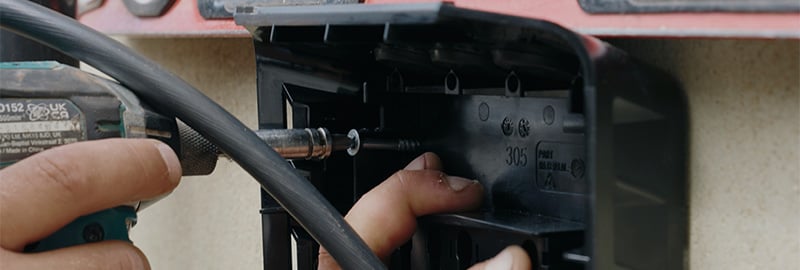
An EV charger installation requires a qualified professional to carry out the work. As a nationwide installer, Smart Home Charge has experienced installers based across the UK.
Once you've paid for your quote, we will order and dispatch your charger right away and get on with the job of arranging your installation date.
A few days before installation we will send you a text message with some guidance on how to get ready for installation day.
On the day of installation you will receive a text message with a link to track your engineer.
While we can't give you an exact time as to when your engineer will arrive at your property, we will give you an installation window in advance, but the tracking link allows you to see exactly how far away the engineer is so you can decide if you've got time to pick up a pint of milk or not!
Our engineers will also require clear access to all work areas, so we ask that you ensure that all work areas are clear before our engineers arrive at your property.
How much does it cost to install an EV charger at home?

The cost of an EV charge point installation depends on the charger you choose and the complexity of the installation. Our website shows the minimum cost of an installation inclusive of the charger.
If you'd like a quick idea of costs, we'd recommend using our Easy Estimate tool to get an electric car charger installation price - it only takes two minutes.
As a guide, prices start from around £922 although you can spread out the cost with our pay monthly finance options. This means that an EV charger installation can cost as little as £12.58 per month.
The good news is that charging at home can save hundreds of pounds per year compared with charging at public networks or spending money on petrol and diesel, so the investment will most likely be paid back within a couple of years.
The home charger itself

There's a range of options on Smart Home Charge to choose from, with the waEV EV1i the current lowest priced option. The Easee One and Ohme ePod are both also available for under £1,000 installed.
Compare prices, functionality and style to find the right option for you using our comparison tool.
Smart Home Charge has also already put together a helpful feature to highlight the best home electric car chargers available right now.
The distance between your desired charger placement and your power supply
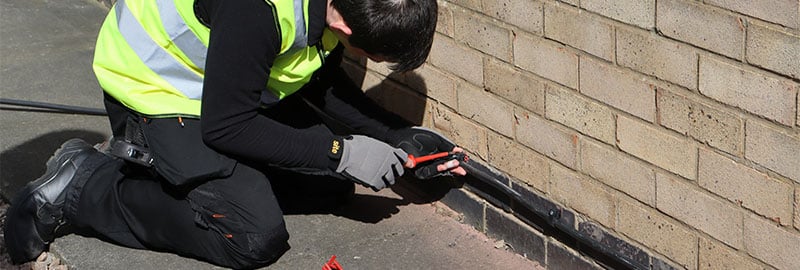
Every charge point includes a "Basic Installation", but charger type, location and cable length are just some of the factors that could affect your final quote.
The vast majority of installations are under 10 metres of cabling between the charger and the property's power supply, which is included in the standard package. However, if your vehicle is further away than this there will be an additional cost to providing the extra cabling. Even if your installation isn't standard, the price you need to pay will be clearly explained and agreed with your quote before you proceed.
Additional parts required

Some EV chargers and properties require an earth rod to be installed, although it's quite rare.
An earth rod is a copper rod that is inserted into the ground and connected to the car charger, creating an earthing system for the charger.
However, most smart home chargers will already have built-in PEN (protective earthed neutral) protection.
The Tesla Wall Connector is an exception to that rule, but Smart Home Charge can install a separate protective device so an earth rod still isn't required, but there is an extra cost to this still.
Certain installations may require additional parts like a type A RCBO. This is a device required for some installations to protect against current overload, AC and DC leakage.
More complex installations that will take longer than the three hours included may also increase the cost of installation.
Installing a three-phase 22kW power supply (if needed)
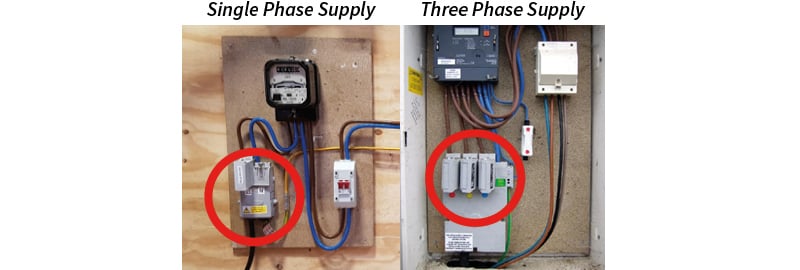
A 7kw charger is more than adequate for the majority of people that need to charge an EV overnight.
However, it's possible some drivers that do higher mileage or for those that just want the flexibility of being able to charge up to three times faster, will want a 22kw home charger installed.
A typical 7kw home charge point can provide up to 30 miles of range per hour whereas 22kW can offer up to 90 miles of range per hour.
A 22kw installation means also having to upgrade the domestic power supply from single phase to three-phase.
Most domestic properties in the UK run on a single-phase power supply meaning the homeowner's DNO will need to make additional upgrades in order to be compatible with a 22kw charger, which can be very expensive running anywhere upwards of £1000.
It's why we would advise customers to think realistically about how quickly they need their EV to be charged up and whether a standard 7kw will do the trick.
Please see our guide to 22kW home EV charging for more information.
Deciding where to put your Home charger
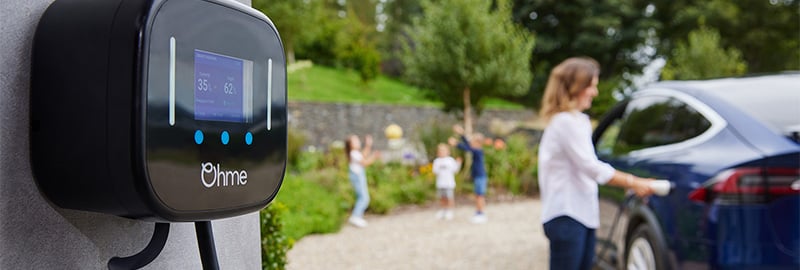
There's are some common sense things to consider when choosing the best place to install your home car charging point.
Nevertheless, if you choose us to install your car charging point, then we will ask you to provide a photo during the Online Site Survey stage to make sure we can accommodate what you need.
Here are a few elements to consider when you're deciding on the best location to install your charge point.
Check the signal in the area

As mentioned earlier on in this guide, the smart charger will need to be able to connect to the internet to manage charges and to talk with your home energy tariff.
Check that there's a stable WiFi or mobile data signal at the site of the charge point installation by trying to connect with another device like a smartphone.
Consider where you park and where the charging port on your car is
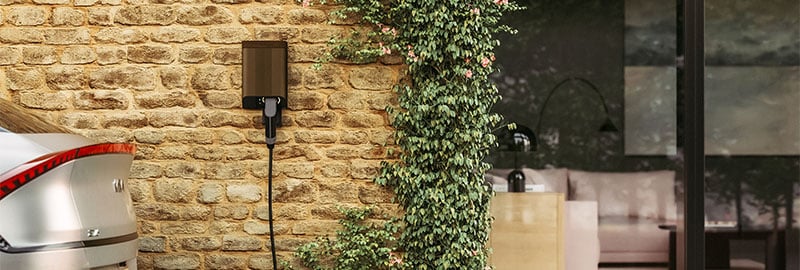
If you place your EV charge point anywhere near where you park your electric car then you've done 90% of the work.
However, don't only think about where you park your electric car now.
Think about where the electric car will be charging most of the time. Will it be in a different place to charge overnight, for instance?
Home charging an electric vehicle may seem simple with off road parking, but some layouts are easier to place a charging unit in than others.
Have a think about where the charging lead needs to get to, how easy the electricity supply is to get to and how you charge your electric car impacts on your neighbours and even your own family – do your children need access to the garage behind the car to get their bikes in and out, for example?
Take cable length into consideration
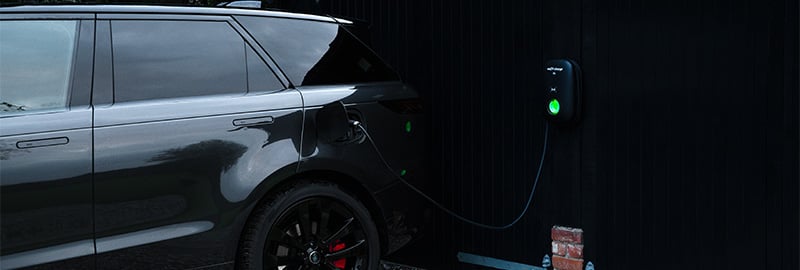
Make sure you think about the length of the cable that either comes with the home charger if it's tethered, or if you're going for a socket only charger then check how long your own cable is as it won't be supplied with the socket-only product.
This is why it's so important to think about where you park to charge an electric car and also where the charge port is.
The charging cables that come attached to tethered chargers are usually 5 metres, but you can get some which are longer – usually at additional cost.
The simplest thing to do here is measure the length of the cable from where you want the charger installing to where the charge port would be on the electric vehicle.
Why should I get a home charger installation?
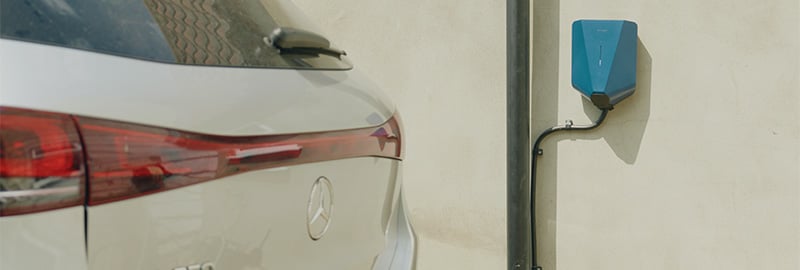
The chances are that if you've got or a thinking about getting an electric vehicle, getting a home charger installed is also going to be high on your priority list.
It's convenient
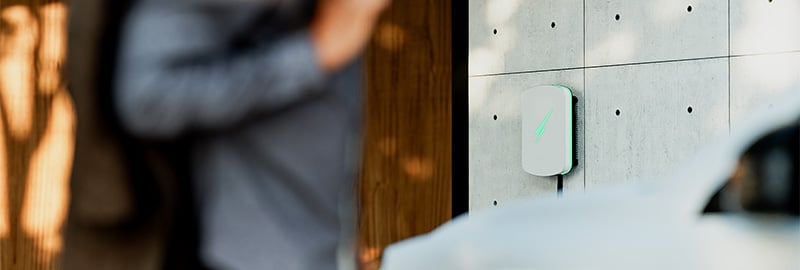
Goodbye to petrol stations. With a home charger installed you will just need to plug-in when you get home and your EV will be ready when you next get back behind the wheel.
Smart scheduling, off-peak home energy tariffs and easy to use apps can all combine to make charging up your EV a stress free business.
Depending on how many miles you do in an average week, it might mean never having to visit a petrol station ever again (the occasional visit to a rapid or destination charger might be on the cards for longer trips).
Home charging is cheaper than charging at a rapid or destination charging point
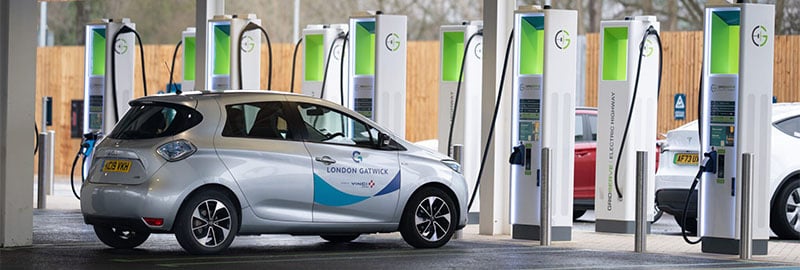
This is another big advantage for those that have off-street parking. The cost to charge at home can be as little as 7.5p/kWh through an EV specific off-peak tariff like Intelligent Octopus Go.
Charging up a Tesla Model Y Performance Dual Motor (one of the most popular EVs in the UK) would cost approximately £5.86 for six hours of off-peak energy through Octopus.
That compares to 63p/kWh at a rapid charger network when charging during off-peak hours, or around £50 for a single charge, or 39p/kWh at an off-peak destination charger or around £30. If you're charging on the road at standard pricing times, the prices will likely be even higher.
As you can see, it's hugely beneficial to charge at home and it's where the biggest cost savings can be found by switching to an EV.
We've created a handy "cost to charge" tool that helps explain in further detail all the differences between home energy prices and what you could pay out on the road. It's highly customisable, so you can put in the exact details for your own EV, mileage and preferred energy supplier.
It's faster (and safer) than charging using a three-pin plug
It is possible to charge up an EV with a standard domestic three-pin plug, but it will be a lot slower than having a 7kw home charger. In fact, having your own dedicated home charger will top up your EV approximately three times faster than a domestic plug.
Charging an EV with a three-pin plug can take over 24 hours, compared to six or seven hours with a 7kw home charger.
It's also a lot safer. Dedicated home chargers are designed specifically for charging EVs and carrying the energy needed over sustained periods.
Home chargers are also weather proof, impact proof and feature safety and security features as standard.
You might be wondering...
Can I mount my home charger on a post?
Installing your charge point on a post can mean some upfront work, such as digging trenches to bury the cabling for the charge point, but it does open up some charger installation options in terms of where you can locate your electric car charger.
Mainly, it means you are not restricted to mounting the home charging unit to a wall, which obviously reduces the number of physical locations to have a charging point installed.
A post could allow you to install your home charge point "in the middle" of your driveway. You probably won't want your charging point installed there, but hopefully you get the idea.
It can involve more work and, therefore, more cost for the installation though. The best thing to do is to start the quoting process (by requesting a quote and completing our Online Site Survey) and point out where you'd ideally like the EV charger and if you'd like it mounted on a post. Our in-house technicians can then assess the possibilities for home charging and provide you with an accurate cost.
Can I mount my EV charger on a fence?
Mounting home charge points on a fence is unwise, because a fence is a temporary structure and could fall down in bad weather – and parking electric cars next to things that could fall over isn't wise.
Fences are usually made from wood and mounting EV chargers and electricity supply cabling would be risky, both for damaging the EV and the risk of electric shock.
Another thing to consider is the amount of sunlight a car charger might be exposed to. Surface-fixed cables should not be exposed to prolonged sunlight unless they are a suitable type.
Black thermoplastic (PVC) cable sheaths contain carbon black which resists the effects of sunlight. White or grey cable sheaths are likely to deteriorate with prolonged exposure to the sun and should always be shielded.








